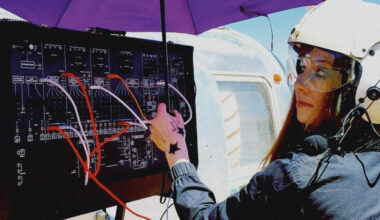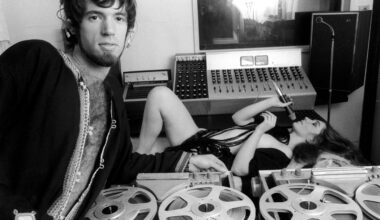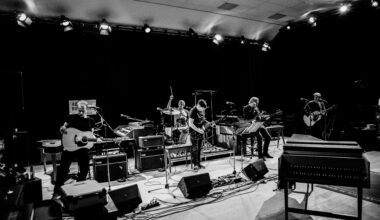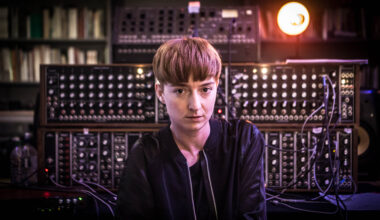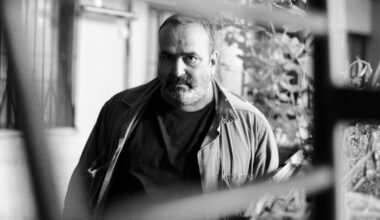“That style of beats is something I’ve been into my entire career,” says Josh Davis, aka DJ Shadow, when I suggest to him that the output of his Liquid Amber label, including his own self-titled Nite School Klik EP, represents a quantum leap from his recorded history thus far.
“When I grew up, I wasn’t able to afford drum machines,” he continues. “So when I was first able to make a record, I was using bits of vinyl and a four-track cassette recorder. The first sampler I was able to get was the MPC. By my way of thinking, if I bought a drum machine, well, that’s great, but then you also need a keyboard and a mixing desk, whereas the MPC was everything in one machine and you could do it all.”
Despite the relatively modest technical means by which it was realised, DJ Shadow’s ‘Endtroducing…..’ album represented a huge and significant statement about the state of music in 1996. It was a reproach to the dominance of hip hop as a rap medium rather than its decreasingly avant garde backbeats. It showed that sampling was just as valid a form of creating music as that achieved on conventional instruments, involving the same processes of decision making, sound assembly, dramatic arcs, and so on.
Drawing on musics past and current and globally sourced, the vast quilt of ‘Endtroducing…..’ suggested that this was the medium in 1996; music had a vast, ignorable legacy and a hectic, eclectic, worldwide present. To hope to make sense of it all was a huge, vertiginous task involving the amassing of thousands of records. It’s not surprising that many punters were frightened by this prospect.
Over the years, in between various projects involving soundtracking and DJing, Shadow has released three more albums, most recently 2011’s ‘The Less You Know, The Better’, which in their different ways confounded the expectations of his fans while building on his reputation. Now he has founded his own Liquid Amber label, home to a number of young fellow San Francisco Bay Area artists, in which he scotches any lingering suspicion that he is an artist happiest immersed in the retro-crackle of old vinyl.
One of the most interesting Amber Liquid releases to date is the awesome ‘Nice Nightmares’ on Nite School Klik’s eponymous EP, which is Shadow himself in collaboration with Santa Cruz bass producer G Jones. It hoves in formidably from an unexpected angle, like a freshly constructed space station, its off-kilter beats and faded, ancient hip hop tropes bouncing and reverberating around gleaming corridors, bridges and walkways. I ask Shadow what was the genesis of this decidedly 21st century project.
“The chain of events started happening when I was given the opportunity to play sets of contemporary music, which is something I hadn’t done since the UNKLE record came out. Back then, I might play a drum ‘n’ bass record, a hip hop record, or maybe even throw in an Oasis record! It was pretty free form, but that’s how the Mo’ Wax nights used to go.
“So when I got the chance again, it took me back to that mindset, and it felt so good to do that, to expose that side of what I’m about. A lot of people think, incorrectly, that I’m a purist, I’m only interested in vinyl, I’m obsessed with the past, and that bemuses me. So this was a chance for me to play stuff that really spoke to me – post-dubstep, footwork, whatever.”
The Liquid Amber output certainly sounds futuristic, rather than a retro mesh. Have you taken on lots of new equipment?
“I started using Ableton in 2009, but only as a means to put a show together,” says Shadow. “We did a tour called Live From The Shadowsphere and in the R&D phase of putting the tour together we determined that Ableton was the most effective method of syncing the music and the visuals. But I still had CDJs and a drum module, so I was still able to perform, there was a bedrock of music underneath. Then in 2012, I decided to go back to school and learn how to make a proper beat on Ableton. It’s a piece of transformative technology, it has a sound, and you can really do things in a way that you can’t do any other way.”

Do you think it’s best to treat the latest technology as a musical instrument, rather than as a labour-saving or shortcutting device?
“Definitely. We’ve been working in largely 4/4 for going on 50 years now and sometimes you don’t have to rent out the most extravagant studio in the world, get all the best pre-amps, the best guitar pedals, to achieve something new. Sometimes it’s as simple as imagining a rhythm played in a slightly different way that causes all sorts of new things to happen. That’s what constantly inspires me about beats and, from an A&R point of view with the Liquid Amber label, I want to be thrown off a bit, I want to people to come up with something that’s slightly tilted. I’m not interested in someone just making this cacophonous noise that no one has ever come up with before. It has to have body and heft to it and something about it that’s slightly different.
“Naturally, my mind has been preoccupied over the last year or so with the Bambaataa tour [the Renegades Of Rhythm tour with Cut Chemist, celebrating the work of Afrika Bambaataa] and you could see Bambaataa’s ‘Planet Rock’ as a perfect example of what I’m talking about. Somebody interpreting Kraftwerk in their own peculiar way and, lo and behold, multiple genres are spawned. I was here at the studio just last week with one of the Liquid Amber artists, Bleep Bloop, and I was playing him Mantronix and telling him how this was my biggest influence. And he was hearing it and saying, ‘Wow, that’s pretty radical for something that’s 30 years old’.”
It’s notable that the artists featured on Liquid Amber are primarily from the San Francisco Bay Area. Do you feel your home ground has been unfairly overlooked by the music industry?
“There’s a lot of people here, but we’ll never be LA. The music industry isn’t based here. It’s based in London, New York, LA, so San Francisco will always have this ‘also ran’ status. It has done for years. That doesn’t really matter to me, but maybe it makes sense that music from the Bay Area speaks a little more closely to me when I listen deeply to it.
“Actually, that’s something else I found interesting about the sets I was putting together. My sets have been always about 30 per cent recognisable and 70 per cent off the wall and strange. Sometimes in the process of discovering artists, you’re never sure where they’re from – Germany, Russia, Korea, whatever – but it slowly became clearer to me that I was gravitating towards music that was from this area. Most times, I discovered that afterwards. I had no idea where Bleep Bloop was from. He’d been putting music out on a German label and while I assumed he probably wasn’t German, I had no idea he was from about an hour from where I lived. The same with G Jones, the same with so many of the records I’ve dropped in sets these last few years.
“Liquid Amber is not about some Bay Area, flag-waving exercise, though. It’s just that, to date, all of the artists happened to be from here. And I don’t think there’s anything wrong with that either. Logistically, we’re all within a short drive from each other and you don’t have to worry about time zones or language barriers or any of that. But I am ready to put out something by someone I met from Virginia, so I’m open to sounds from anywhere.”
There’s a lot of talk about the gentrification of San Francisco, what with the tech industry that has settled around the city. It’s said it’s an unaffordable parody of the place it once was. Has that had an impact on the music scene?
“There are a lot of obvious physical changes to the city but that’s also happening nationwide. You walk around Manhattan and it’s shocking how much it’s changed. Or Brooklyn. East New York used to be a no-go area, now it’s unthinkable what’s happening to it. In San Francisco, well, a lot of artists have been priced out and moved to the East Bay, but it’s still the Bay Area. People shift around within a 20-mile radius, yet the same forces that create inspiration for artists here continue to be present. As for the tech industry, I always say we should at least be happy it’s happening in the city, because if it was happening somewhere else we’d simply be grumbling about how nothing goes on here.”
You talk about not being a purist or a vinyl obsessive or a retro maniac. Where do you sit with the current revival of vinyl? And what about the debates around analogue versus digital and the validity of new formats?
“I’ve never been an audiophile,” declares Shadow. “Sometimes people are quite disappointed when they come up to me for advice on whether to buy a $2,500 turntable and I’m always like, hey, I made music on a four-track. ‘Endtroducing…..’ was mixed on a $700 16-track analogue Mackie.
“I think I have an affinity for vinyl because there’s [a] 100 years of creative output on that format. I care about eight-tracks exponentially less because it was a disposable format, although I collect it, as I do cassettes, CDs, mp3s… So to me it’s that vinyl was THE format for a long time and as such it holds sway in my heart, not in a purist sense but because there’s so much music available on vinyl. But then towards 2008 or 2009, I found I was losing opportunities to purchase vinyl as all the major chain stores, like Tower Records, were closing around me. I remember there was one in Piccadilly in London, right? That’s gone? There we are. So as those places disappeared, and there wasn’t yet something like Soundcloud, and I was feeling, ‘This is pretty fucked up, my options are being removed without my having any say’.
“Now I feel that whatever format the artists are releasing material on, that’s what I’m going to support. If it’s on Soundcloud, then I’ll get it on Soundcloud and that’s just fine. With Liquid Amber, it’s a free digital label, but if you want it on vinyl, that can be done. It’ll cost money because it costs money to make, but it can be done. I guess my philosophy is, hey, if it came out on CD, then CD’s the format I’d want to have it on. If it came out as a wav file, then that would be my preferred format.”

In the past, you’ve described the internet, which exploded shortly after ‘Endtroducing…..’, as “decimating” the music industry. Ever wish it had never been invented? Or do you find advantages to it?
“From a music discovery perspective, the last five years have been incredible. Soundcloud is great. Prior to that, there was nothing out there I felt any user affinity to. Some things click with me, others don’t. Twitter yes, Facebook no. People do get put out of shape if you say anything contrary about the internet, though. Even if you casually remark on the old days and the way things are now, people look for any reason to label you a hater or a Luddite. And to me, it’s very pragmatic. I was never abused by the music industry, so I don’t buy into that bashing. At the same time, there were benefits then and there are benefits now, as well as disadvantages both ways. If I say to people that I make a lot less money than I used to, that’s just a casual fact. There’s no subtext to it. Luckily, there are still a lot of patrons of the arts. I appreciate it when people come out and see me play or support what I do.
Get the print magazine bundled with limited edition, exclusive vinyl releases
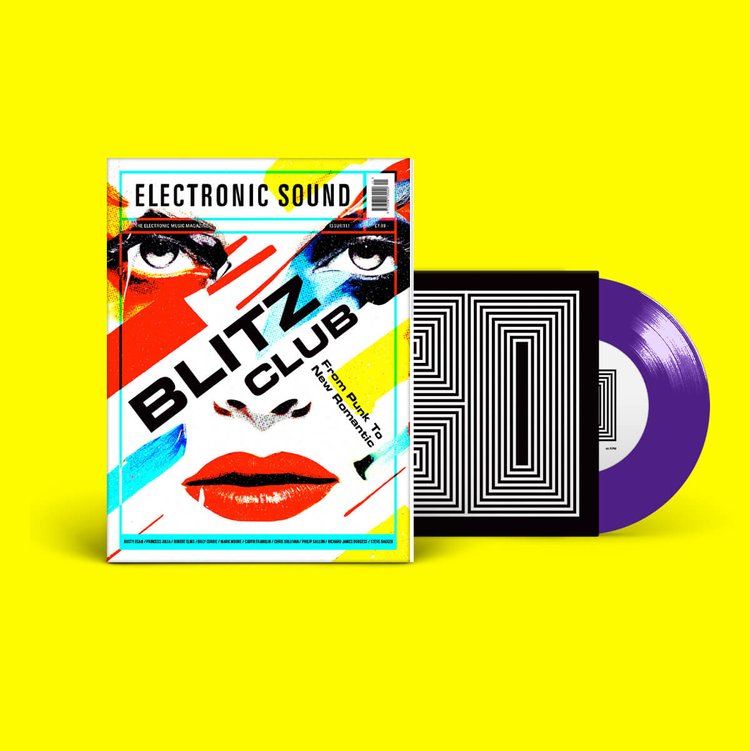
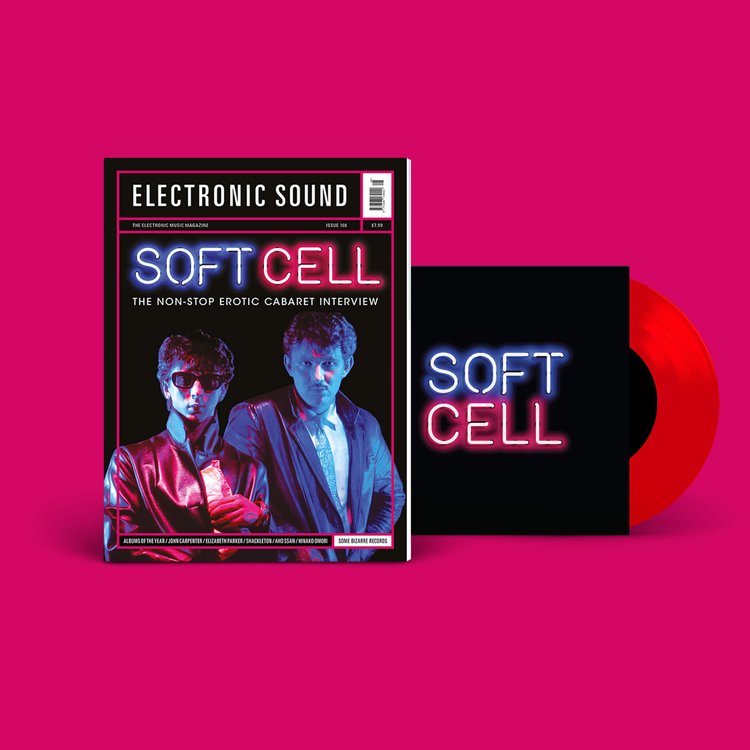
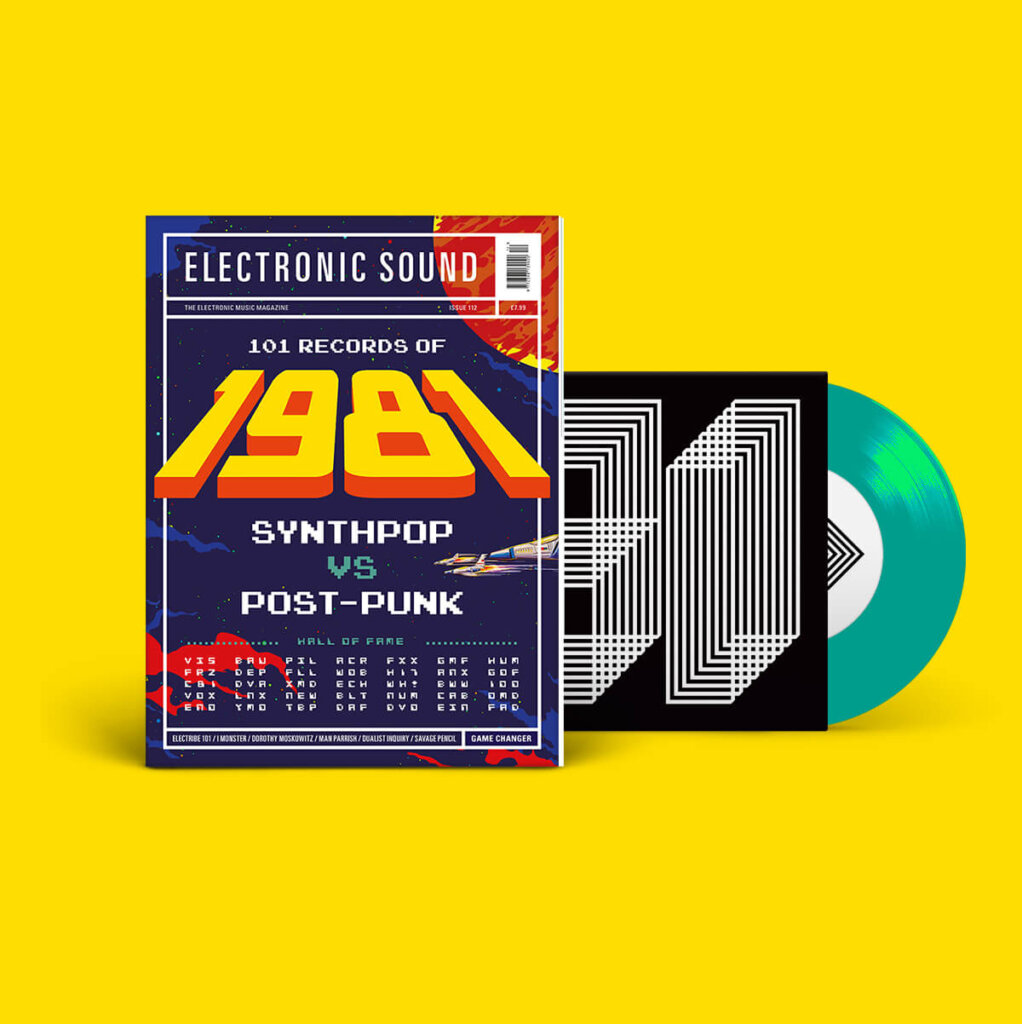
What do you make of the rise of EDM and DJs supplanting stadium rock?
“I’m happy for anything that allows DJs to express themselves. But if the tables were turned and I was a rock purist and that’s where all my energies were based, I’d be very unhappy right now. I’ve personally never been comfortable with the idea of being some kind of entertainment machine onstage, that’s never been my thing. But as we know, all this started in the UK years ago, so I do feel I have a longer perspective on it. Fatboy Slim at Brighton Beach, the whole Chemical Brothers Big Beat stuff… Still to this day, I don’t think those events have been touched. I was upbeat about it then and I’m upbeat about it now, even if I don’t necessarily care for everything those DJs play. That’s not really my lane anyway.”
Finally, we’re not far away from the 20th anniversary of ‘Endtroducing…..’. The title itself implies that it was your opening statement but also a definitive one. That’s been quite a challenge to set yourself as you move on, career-wise, through the decades, to live up to and get past the legacy of your debut album.
“I think that’s something very obviously intrinsic in the title and I’m surprised more people didn’t pick up on that. My thinking then, and with all my subsequent releases, is that this isn’t a sound I’m going to beat into the ground ad infinitum. Of course, I didn’t know how the album was going to be received, but that can’t change my modus operandi either. ‘Endtroducing…..’ has been a wonderful gift and I could never say anything negative about it.”
Nite School Klik’s self-titled debut EP is out now on Liquid Amber
Endtroducing…..The 1996 Review
Electronic Sound editor Push was one of the first UK journalists to stick his neck out and proclaim ‘Endtroducing…..’ the masterpiece that it is. “Unique, uncompromising, unsurpassable,” he said. Here’s that review, first published in Muzik magazine a month upfront of the album’s November 1996 release
Stuttered beats, fluttered beats. Scratching harder and faster than the caretaker’s cat at the local fleapit. Pianos that tease and prick, b-lines that cajole and haul. Feedback and dub. An angel with broken wings sobbing pitifully in the distance. A saxophone tuned by the devil himself. Superfly speak and loopy luna talk. Backwards stuff, sideways stuff, inside out and halfway up the third flagpole from the left stuff.
The world of DJ Shadow is way out west. Further out west than Bristol, that’s for sure. Remember trip hop? Good. Congratulations. Now forget it.
Forget all the usual reference points that get rolled out for most Mo’ Wax releases too. Shadow is from the San Francisco/Oakland Bay Area and, maybe sometimes without even realising it, he has soaked up the influences of California’s greatest icons from years long gone. The loose-boned funk of Sly Stone and the weight of War. The twisted blues of Janis Joplin and the bugged-out bravado of Country Joe McDonald. You can’t sing along to many of Shadow’s tracks, but the melancholic popadelic sensibility of the Walker Brothers is occasionally there too, deep in the mix.
Don’t be misled, though. ‘Endtroducing…..’ is very much a hip hop release. Entirely made up of samples, snatches of other people’s tracks, the whole concept of Shadow’s debut album harks back to the earlier days of the genre. The days when Kool Herc and DJ Flowers would just set up and let rip down at the park, the days when the guy cutting and scratching was the real star and the rapper was merely one of his mates. A mate whose legs were too thin to be given the far more important job of pedalling the bike which kept the DJ’s generator going.
And despite these blasts about the past, ‘Endtroducing…..’ is also very much an album of the 1990s. Sometimes beyond. Sometimes so far beyond that we’re not actually talking about the 1990s anymore but the 2090s. ‘Building Steam With A Grain of Salt’, for instance, would be the perfect theme tune for a remake of ‘The Good, The Bad And The Ugly’, with Robocop cast as The Man With No Name. ‘Stem/Long Stem’ is meanwhile best described as a futuristic heavy metal track. You’d better practise a few air turntable solos.
‘The Number Song’ and ‘Napalm Brain/Scatter Brain’ are equally tough. The former sounds rather like The Chemical Brothers so off their faces they’ve replaced their styluses with sledgehammers. The latter starts as a rumbling dope cut before switching to a mad frenzy of military snares by way of funky guitar riffs so slow they’re painful. In stark contrast, the one-fingered piano playing and truly heavenly vocals of ‘Midnight In A Perfect World’ will fill your head with blissful thoughts. So will the first and fourth parts of ‘What Does Your Soul Look Like’.
Throughout all this, Shadow is ably assisted by The Automator, whose credits include Kool Keith’s hilarious ‘Dr Octagon’ project. And though nothing here can match the outrageous humour of the Kool Keith record, there are still flashes of wonderfully dippy dizziness. Get a load of ‘Why Hip Hop Sucks In ‘96’, a 40-second snapshot which closes with the words “It’s the money”. Catch the insane backwoods boy who wants to play his little buddy at checkers, while you’re at it.
‘Endtroducing…..’ is rounded off with a sample from David Lynch’s ‘Twin Peaks’. Remember the episode where Agent Cooper dreams of a giant who tells him “It’s happening again”? Good. Congratulations. Now forget that as well. Because it sure as hell isn’t going to happen like this again.
Unique, uncompromising, unsurpassable. Buy, buy, buy.


